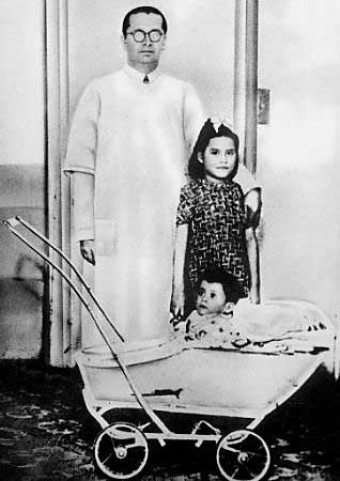
<>_<>uN BELIevable<>_<>
The Youngest Person to Give Birth Was Only 5 Years Old
Today I found out that the youngest person to ever become pregnant and give birth was only 5 years old!
Lina Medina was born on September 27th, 1933 in Ticrapo, Peru. At age 5, her mother, Victoria, brought her to a hospital because her stomach was increasing in size. Her parents originally thought Lina was possessed by evil spirits, but upon examining her, Dr. Geraldo Lozada found she was approximately 8 months pregnant. A month and a half after her diagnosis, on May 14, 1939, Lina gave birth via caesarian section to a baby boy.
Lina was able to become pregnant at such a young age due to a rare condition known as precocious puberty, basically, an early onset of sexual development. Most girls begin showing signs of puberty around 10 years old. The majority of boys tend to go through puberty starting around the age of 11-12. People with precocious puberty tend to begin puberty around the age 7. Shockingly, according to her mother, Lina, on the other hand, began having menstrual cycles at age 2 ½ and her breasts were developed by age 4. When the doctors examined her at age 5, she was found to already have fully mature sexual organs.
Lina Medina's son, Gerardo, was named after Lina's doctor and grew up believing that his mother was his sister. It wasn't until the age of 10 that he found out who his mother really was. He died in 1979 at 40 years old of a bone marrow disease. Lina never revealed the father of the child, nor the circumstances of her impregnation. According to a 1955 article reviewing the case, done by Luis Leon of the Associated Press, "Some pointed out there were frequent festivities celebrated by Indians in Andean villages, like the one where Lina was born. These often ended up in orgies in which rape was not uncommon."
While this is hardly something one would want to hold the record for, for a so many reasons, it would seem that Lina is unlikely to lose this record any time soon (or one would at least hope so!) So, for now, the current record for youngest human being to give birth to another is 5 years, 7 months, and 17 days, which means she was probably impregnated a month or two before her fifth birthday. Disturbing…
Lina Medina was born on September 27th, 1933 in Ticrapo, Peru. At age 5, her mother, Victoria, brought her to a hospital because her stomach was increasing in size. Her parents originally thought Lina was possessed by evil spirits, but upon examining her, Dr. Geraldo Lozada found she was approximately 8 months pregnant. A month and a half after her diagnosis, on May 14, 1939, Lina gave birth via caesarian section to a baby boy.
Lina was able to become pregnant at such a young age due to a rare condition known as precocious puberty, basically, an early onset of sexual development. Most girls begin showing signs of puberty around 10 years old. The majority of boys tend to go through puberty starting around the age of 11-12. People with precocious puberty tend to begin puberty around the age 7. Shockingly, according to her mother, Lina, on the other hand, began having menstrual cycles at age 2 ½ and her breasts were developed by age 4. When the doctors examined her at age 5, she was found to already have fully mature sexual organs.
Lina Medina's son, Gerardo, was named after Lina's doctor and grew up believing that his mother was his sister. It wasn't until the age of 10 that he found out who his mother really was. He died in 1979 at 40 years old of a bone marrow disease. Lina never revealed the father of the child, nor the circumstances of her impregnation. According to a 1955 article reviewing the case, done by Luis Leon of the Associated Press, "Some pointed out there were frequent festivities celebrated by Indians in Andean villages, like the one where Lina was born. These often ended up in orgies in which rape was not uncommon."
While this is hardly something one would want to hold the record for, for a so many reasons, it would seem that Lina is unlikely to lose this record any time soon (or one would at least hope so!) So, for now, the current record for youngest human being to give birth to another is 5 years, 7 months, and 17 days, which means she was probably impregnated a month or two before her fifth birthday. Disturbing…
Bonus Factoids
•At age 70, Rajo Devi Lohan became the oldest person to ever give birth to a child. Eighteen months later she announced that she was dying from complications from the pregnancy.
•There are several theories as to what factors might cause precocious puberty, such as: increased caloric intake; foods rich in artificial hormones; and various environmental factors like pesticides, such as DDT. Most recently, researchers have pinpointed a gene (a protein called GPR54) that regulates puberty. Mutations in this gene have been shown to cause deviations in sexual development.
•Precocious puberty in boys, defined as development before age 9, is quite rare (1 in 10,000 in the United States), but when it does occur is often associated with central nervous system problems that need treatment.
•A study done in Denmark from 1993-2001 showed that the incidence of precocious puberty in girls less than 2 years of age was 0.5 per 10,000. From this first epidemiological study based on national registries, it was estimated that 0.2% of all Danish girls and <0.05% of Danish boys had some form of precocious pubertal development.
•According to the American Medical Association, sexual violence and rape in particular, is considered the most under-reported violent crime.
•A 2007 government report from England says "Estimates from research suggest that between 75 and 95 per cent of rape crimes are never reported to the police." The most common reasons given by victims for not reporting rapes are the belief that it is a personal or private matter and that they fear retaliation from the assailant.
•It is estimated that a woman born in South Africa has a greater chance of being raped than learning how to read. The South African Police Service readily admits that even though there is now a greater awareness of the problem, more stringent penalties, and better policing, the vast majority of rapes and attempted rapes still go unreported and unpunished.
•Wednesday has more births on average than any other day of the week, 15.4% more then any other day. Sunday is the slowest day.
•At age 70, Rajo Devi Lohan became the oldest person to ever give birth to a child. Eighteen months later she announced that she was dying from complications from the pregnancy.
•There are several theories as to what factors might cause precocious puberty, such as: increased caloric intake; foods rich in artificial hormones; and various environmental factors like pesticides, such as DDT. Most recently, researchers have pinpointed a gene (a protein called GPR54) that regulates puberty. Mutations in this gene have been shown to cause deviations in sexual development.
•Precocious puberty in boys, defined as development before age 9, is quite rare (1 in 10,000 in the United States), but when it does occur is often associated with central nervous system problems that need treatment.
•A study done in Denmark from 1993-2001 showed that the incidence of precocious puberty in girls less than 2 years of age was 0.5 per 10,000. From this first epidemiological study based on national registries, it was estimated that 0.2% of all Danish girls and <0.05% of Danish boys had some form of precocious pubertal development.
•According to the American Medical Association, sexual violence and rape in particular, is considered the most under-reported violent crime.
•A 2007 government report from England says "Estimates from research suggest that between 75 and 95 per cent of rape crimes are never reported to the police." The most common reasons given by victims for not reporting rapes are the belief that it is a personal or private matter and that they fear retaliation from the assailant.
•It is estimated that a woman born in South Africa has a greater chance of being raped than learning how to read. The South African Police Service readily admits that even though there is now a greater awareness of the problem, more stringent penalties, and better policing, the vast majority of rapes and attempted rapes still go unreported and unpunished.
•Wednesday has more births on average than any other day of the week, 15.4% more then any other day. Sunday is the slowest day.
•C-Sections account for 31.1% of all births in the United States, rising 50% over the last decade. Induced labor accounts for 22.5% of births in the U.
References:
- Youngest Mother Awaits Aid
- Little Mother
- Why Puberty Begins At Age 7
- Precocious Puberty, How Early Is Too Early
- Study Of Precocious Puberty
- Rape statistics
- Rape, A Silent War On South African Women
- The Worlds Oldest Mother
- Labor Statistics
- Image Source
__._,_.___
VISIT RUKHSANA FM ONLINE RADIO
http://www.freewebs.com/rukhsanafm
http://www.freewebs.com/rukhsanafm
http://www.freewebs.com/rukhsanafm
http://magicsgifs.blogspot.com
http://magicsgifs.blogspot.com
http://magicsgifs.blogspot.com
***********************************
Enjoy your stay at Rukhsana Group.
Moderators Rukhsana Group:
Aika Rani,Sitara Ansari, Lilly ,A k h t a r,Mumtaz Ali
Contact us at: llolli_bobby@yahoo.com
Aika_Rani@Yahoo.Com
akhtar_khatri2001@yahoo.com
Rukhsana-owner@yahoogroups.com
**********************************
MARKETPLACE
.
__,_._,___























.jpg)
0 comments:
Post a Comment